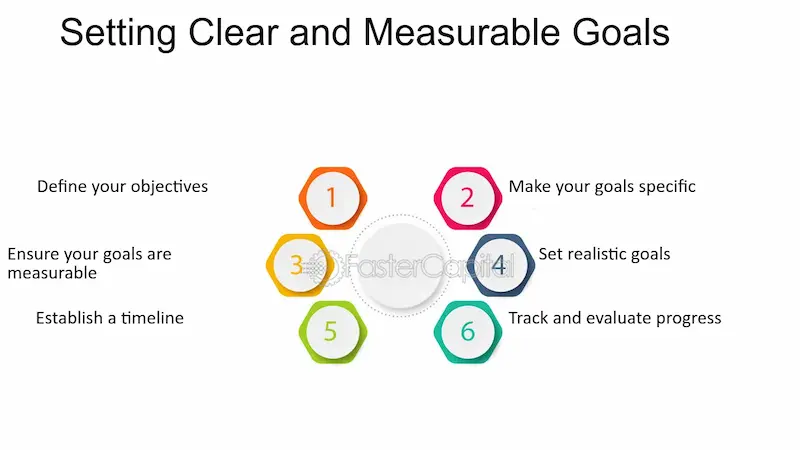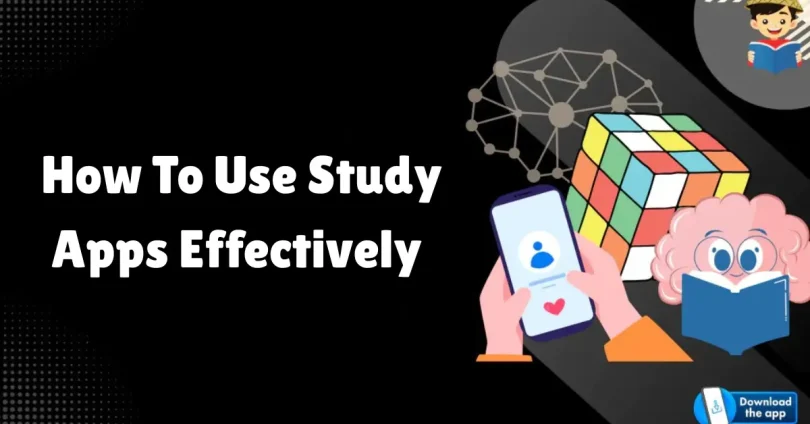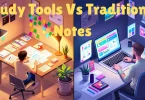In today’s digital age, study apps have completely transformed the way we learn. Imagine Sarah, a college student, trying to juggle multiple courses while preparing for her final exams—without the right tools, she feels overwhelmed and disorganized. With study apps, however, she can plan her schedule, track her progress, and review important concepts anytime, anywhere.
Whether you’re a high school student prepping for exams, a professional learning new skills for work, or someone pursuing a hobby, study apps can make learning faster, smarter, and even fun. But here’s the thing: just having an app on your phone isn’t enough.
Knowing how to use study apps effectively is what turns them into powerful learning tools rather than just another distraction. Let’s explore a detailed, easy-to-follow guide to help you get the most out of your study sessions.
1. Set Clear, Measurable Goals

The first step to using study apps effectively is clarity. Ask yourself what you want to achieve in each session, day, or week. Without specific goals, even the most advanced apps can feel overwhelming.
How to set goals effectively:
- Daily Goals: “Learn 20 new French words today” or “Complete two chapters of biology.”
- Weekly Goals: “Finish half of the course modules by Friday” or “Achieve a 90% score on all quizzes this week.”
- Long-Term Goals: “Prepare for the SAT in 3 months” or “Master Python programming by year-end.”
Tip: Write down your goals and review them every morning. This keeps you focused and motivated, and apps often let you set reminders to help stay on track.
2. Choose Apps That Match Your Learning Style
Not all study apps suit everyone. The key to using study apps effectively is choosing tools that align with how your brain absorbs information best.
- Visual Learners: Mind maps, diagrams, charts, and infographics make information easier to grasp. Apps like MindMeister or SimpleMind are perfect for creating visual summaries of what you’re learning.
- Auditory Learners: If you remember things by listening, choose apps with audio lessons or text-to-speech features. Audible or Quizlet’s audio flashcards can help reinforce concepts.
- Kinesthetic Learners: If you learn by doing, interactive exercises, gamified quizzes, or flashcards are ideal. Apps like Kahoot! or Brainscape let you engage with content actively.
Pro Tip: Experiment with different apps to see what feels natural. You may find that combining multiple styles works best.
You may also like to read this:
Why Skill Development Is Important For Careers Growth
Top Career Growth Tips For Professionals Ranked For 2025
Career Growth Vs Career Change: Key Differences Explained
What Are Study Tools? Tips For Effective Learning
Top 12 Types of Digital Study Tools For Smarter Learning
3. Minimize Distractions
Even the best study app can’t help if you’re constantly interrupted. Learning in a distraction-free environment is crucial.
How to create focus-friendly study sessions:
- Turn off notifications on your phone and computer.
- Use website blockers like Cold Turkey or Freedom if you study on a laptop.
- Designate a quiet study space with good lighting, a comfortable chair, and all the materials you need.
Extra Tip: Some apps, like Forest, gamify focus by planting virtual trees that grow while you study. It’s a fun way to stay off your phone!
4. Employ Active Study Techniques
Active learning is the secret to remembering and understanding information. Passive scrolling or rereading won’t stick. Using study apps effectively means leveraging interactive features that test your knowledge.
Active study methods to try:
- Flashcards: Great for memorization—terms, definitions, historical dates, formulas. Apps like Anki let you review cards using spaced repetition.
- Quizzes: Self-testing reinforces learning. Apps like Quizlet or Brilliant offer thousands of quizzes on various topics.
- Practice Exercises: Engage with problems or simulations, especially for math, coding, or science subjects.
Pro Tip: Mix different techniques. For example, create flashcards, then take a quiz on the same topic. It strengthens memory retention.
5. Track Your Progress
Tracking progress is a powerful motivator and a way to spot weaknesses early. Many study apps come with analytics, streak counters, and progress graphs.
How to track your learning effectively:
- Set daily, weekly, and monthly milestones and check your progress regularly.
- Review your scores or quiz results to identify areas that need more practice.
- Adjust your study plan based on your strengths and weaknesses.
Example: If your flashcard app shows that you’re repeatedly missing certain terms, spend extra time on those instead of revisiting concepts you already know.
6. Take Regular Breaks
Even with the best apps and strategies, your brain needs downtime. Continuous studying can lead to fatigue and reduce retention.
How to structure breaks:
- Pomodoro Technique: Study for 25 minutes, then take a 5-minute break. After 4 cycles, take a longer 15–30 minute break.
- Stretch, hydrate, or take a short walk to refresh your mind.
- Avoid using your break to scroll social media—it can kill your focus.
Tip: Apps like Focus Booster or Be Focused can help schedule timed study and break sessions.
7. Celebrate Your Achievements

Recognizing progress keeps you motivated. Reward yourself when you hit milestones, no matter how small.
- Complete a tough module? Treat yourself to a snack or a short episode of your favorite show.
- Maintain a streak for a week? Share your achievement with a friend or write it in your journal.
- Beat your previous quiz score? Take a moment to feel proud!
Celebration creates positive reinforcement, which makes sticking to your study routine easier and more enjoyable.
8. Customize Your Study Experience
One of the biggest advantages of digital study apps is their customizability. Unlike traditional textbooks, apps often allow you to tailor your study environment and learning methods.
- Adjust difficulty levels: Many apps like Duolingo, Khan Academy, or Brilliant let you choose beginner, intermediate, or advanced exercises based on your skill level.
- Personalize content: Highlight, bookmark, or create notes for topics that are challenging or particularly important.
- Set reminders: Schedule study sessions at times when you’re most alert. Most apps allow push notifications to remind you to study without overwhelming you.
Customizing your experience ensures that your study sessions remain efficient and enjoyable, keeping you motivated to stick with your plan.
9. Combine Apps With Offline Study Methods
Even though study apps are powerful, they work best when combined with traditional learning methods.
- Handwritten Notes: Writing by hand helps reinforce memory. After completing a module on an app, summarize key points in a notebook.
- Whiteboards or Mind Maps: Visualize connections between concepts that you’ve learned digitally.
- Discussion Groups: Share insights from your app-based study sessions with classmates, friends, or online study communities.
This hybrid approach deepens understanding and helps cement information in your long-term memory.
10. Avoid Overloading Yourself
It’s tempting to install multiple study apps and try them all at once. However, doing too much can lead to cognitive overload and reduce efficiency.
How to avoid overloading:
- Stick to 1–3 primary apps for your main study topics.
- Focus on one subject or skill at a time rather than multitasking.
- Schedule study sessions realistically, leaving time for rest and review.
Remember, consistency beats intensity. Regular, focused sessions with a few key apps are far more effective than trying to learn everything at once.
11. Review and Reflect Regularly
Reflection is an often-overlooked step in learning. Apps can track progress, but you also need to review and reflect on what you’ve learned.
- Weekly Reviews: Look at your achievements and areas needing improvement. Adjust goals and study methods accordingly.
- Error Analysis: Identify mistakes in quizzes or exercises and focus on correcting them.
- Learning Journals: Maintain a digital or physical journal to jot down insights, challenges, and breakthroughs.
Regular reflection helps reinforce learning, prevents gaps in knowledge, and keeps you aware of your growth over time.
12. Leverage Collaborative Features
Many modern study apps include collaborative features that allow you to learn with others. Using these features effectively can make studying more engaging and productive.
- Shared Flashcards: Apps like Quizlet let you share sets with classmates.
- Study Groups: Platforms like Notion or Google Classroom allow collaborative note-taking and discussion.
- Leaderboards and Challenges: Gamified apps often let you compete with friends to stay motivated.
Collaborating or competing with peers can make learning more dynamic and enjoyable, keeping motivation high.
Advanced Tips for Maximum Effectiveness
- Spaced Repetition: Use apps that automatically schedule reviews of material at optimal intervals for memory retention.
- Adaptive Learning: Some apps adjust difficulty based on your performance, ensuring you are always challenged but not overwhelmed.
- Integration: Sync your study apps with calendars or productivity tools to maintain a structured routine.
- Data Export: Export notes, flashcards, or progress reports to revisit offline or integrate with other study methods.
Final Thoughts
Mastering how to use study apps effectively isn’t just about using technology—it’s about creating a structured, focused, and personalized learning journey. By setting clear goals, choosing apps that fit your learning style, minimizing distractions, actively engaging with content, tracking progress, and reflecting regularly, you can turn study apps into powerful allies in your educational journey.
Remember, learning is a marathon, not a sprint. Combine digital tools with offline techniques, take breaks, celebrate achievements, and adjust your methods as you grow. With consistency, focus, and smart use of study apps, you’ll not only achieve your goals but also develop lifelong learning habits that will serve you well in any field.
FAQs
1. What are study apps?
Study apps are digital tools designed to help learners organize, understand, and retain information. They include features like flashcards, quizzes, mind maps, and progress tracking to make learning more interactive and efficient.
2. How can I use study apps effectively?
To use study apps effectively, set clear goals, choose apps that match your learning style, minimize distractions, use active learning techniques, track your progress, take regular breaks, and celebrate achievements. Combining apps with offline methods can further enhance learning.
3. Which study app is best for visual learners?
Visual learners benefit from apps like MindMeister, SimpleMind, or Lucidchart, which allow them to create mind maps, diagrams, and charts to visualize information.
4. Can study apps really improve memory and retention?
Yes! Many apps use techniques like spaced repetition, quizzes, and interactive exercises, which reinforce learning and improve long-term memory retention.
5. How do I avoid distractions while using study apps?
Turn off unnecessary notifications, use website blockers on computers, create a quiet study space, and consider apps like Forest that gamify focus and discourage phone usage during study sessions.




